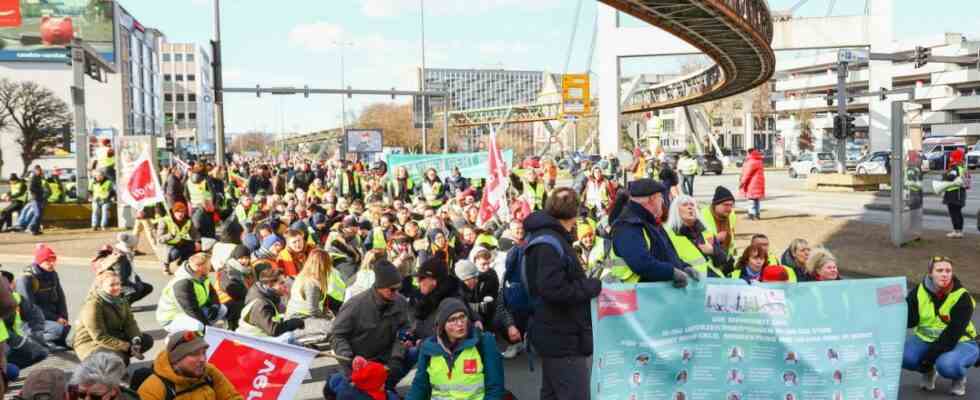At the end of the week, Germany has to prepare for enormous restrictions in local public transport. Verdi is calling on public sector employees in several federal states to go on warning strikes. They are to take place at the same time as a global climate strike by “Fridays for Future” this Friday.
In Munich, the warning strike in local transport starts even earlier, on Thursday morning. Subways and trams will no longer run at all. An overview of what is paralyzed when and where.
Baden-Wuerttemberg
If you want to use local transport on Friday, you should have problems in Stuttgart, Freiburg, Mannheim, Heilbronn, Ulm, Esslingen, Konstanz and Baden-Baden. On Tuesday, the Verdi union called on local public transport workers in the eight cities to stop working all day.
Bavaria
In Munich, the subways, trams and around half of the buses will be affected from Thursday morning to Friday night. The S-Bahn, which is operated by Deutsche Bahn, should run normally.
Local transport employees in the greater Nuremberg, Augsburg, Regensburg, Ingolstadt, Bamberg, Landshut and Bayreuth areas are also called on to go on warning strikes on Friday.
There is a special feature in Bavaria: the warning strikes fall on the same day as in many other federal states, but the employees have their own collective agreement. Bavarian public employees are not included in the nationwide public service collective agreement (TVÖD). Unlike their colleagues, they are on strike for themselves, so to speak.
Hesse
According to the regional magazine “Hessenschau”, the subways and trams in Frankfurt will be at a standstill. In Wiesbaden the buses of the transport company ESWE. In Kassel, the strike affects buses and trains.
Lower Saxony
The strikes in the transport companies in Lower Saxony paralyzed almost the entire state on Friday. Salzgitter, Bad Harzburg, Wolfenbüttel, Helmstedt, Goslar, Lüneburg, Stade, Cuxhaven, Buxtehude and Winsen/Luhe, Hoya, Verden, Zeven, Bentheim, Hildesheim, Hameln-Pyrmont, as well as the city and district of Celle are affected. Verdi has also called on workers in Hanover, Braunschweig and Göttingen to go on strike.
Even before that, there should be major restrictions on buses and trains in many Lower Saxony cities and districts on Thursday. Verdi indicated this in south-eastern Lower Saxony (Salzgitter, Bad Harzburg, Goslar, Wolfenbüttel, Helmstedt), but also in the north-east. Around Lüneburg alone, a good 10,000 schoolchildren would have to reckon with problems in bus traffic, the administration warned in advance.
Negotiations are also taking place here in another collective bargaining round. According to Verdi, the strike by colleagues will be joined on Friday: “It is to be expected that large parts of public transport in Lower Saxony will come to a standstill.”
North Rhine-Westphalia
According to Verdi NRW, one focus of the strikes is the Ruhr area from Duisburg to Dortmund. The Rhineland is also to be intensively struck. “We are assuming a high level of strike participation and over 10,000 strikers nationwide on Friday,” said a Verdi spokesman. According to media reports, there are also strikes in Bonn, Aachen, Essen, Bochum, Gelsenkirchen and Oberhausen.
In Cologne there was already a strike on February 27th.
(Photo: Christoph Hardt/IMAGO/Panama Pictures)
Rhineland-Palatinate
Like a Verdi spokeswoman dem SWR said, Mainz, Ludwigshafen, Kaiserslautern and Trier are affected by the strikes on Friday.
Saxony
According to the Verdi state district of Saxony, “widespread warning strikes” will take place in the regions of Chemnitz, Dresden, Zwickau and East Saxony, including on Friday. Exactly which locations are affected will be announced on Wednesday.
Joint strike with “Fridays for Future”
“We want to combine the global climate strike day with the 200 actions of ‘Fridays for Future’ with warning strikes in local public transport,” said deputy Verdi boss Christine Behle. “A traffic turnaround will not be possible without investing in employees as well.”
In the negotiations for the millions of federal and local employees, the Verdi union and the civil servants’ association dbb are demanding 10.5 percent more income, but at least 500 euros more per month. No agreement was reached in the second round of negotiations last week. The unions had rejected an offer from the employers as insufficient.
The offer includes, among other things, a pay increase of five percent in two steps and one-off payments totaling 2,500 euros. Behle said: “This is a slap in the face to the employees.”
The third and probably decisive round of negotiations is scheduled for the end of March. The negotiations have been accompanied by warning strikes in various cities for several weeks, including work stoppages in hospitals and garbage disposal.

